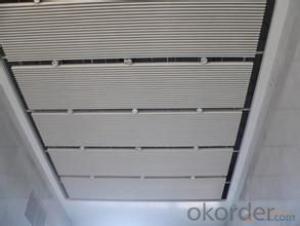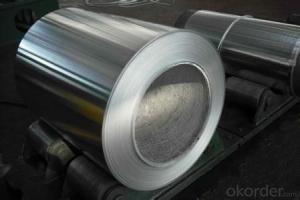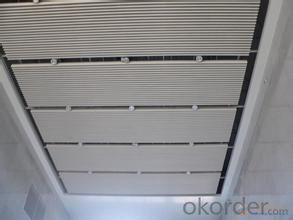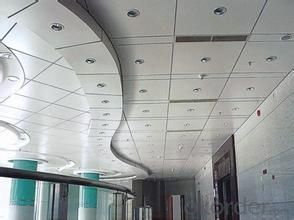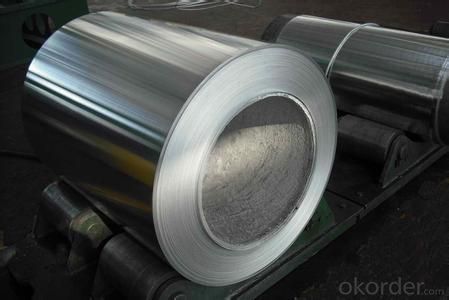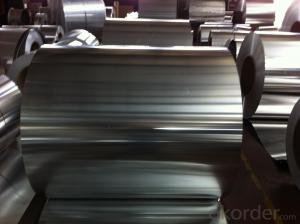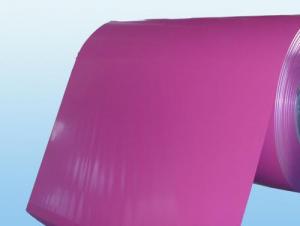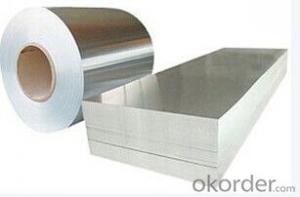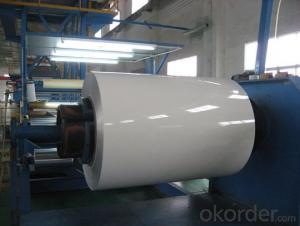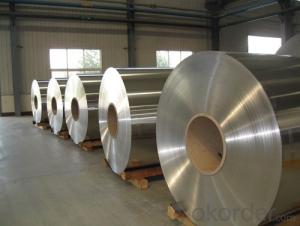1100 Aluminum Coils for Ceiling - Alu Coil for Sale
- Loading Port:
- China Main Port
- Payment Terms:
- TT OR LC
- Min Order Qty:
- -
- Supply Capability:
- -
OKorder Service Pledge
OKorder Financial Service
You Might Also Like
Aluminium is a relatively soft, durable, lightweight, ductileand malleablemetalwith appearance ranging from silvery to dull gray, depending on the surfaceroughness. It is nonmagnetic and does not easily ignite. A fresh film ofaluminium serves as a good reflector (approximately 92%) of visible lightand an excellent reflector (as much as 98%) of medium and far infraredradiation. The yield strength of pure aluminium is 7–11 MPa,while aluminium alloys have yield strengths ranging from200 MPa to 600 MPa. Aluminium has about one-third the densityand stiffness of steel. It is easily machined,cast, drawn and extruded.
Aluminium alloys (or aluminum alloys; see spellingdifferences) are alloysin which aluminium(Al) is the predominant metal. The typical alloying elements are copper, magnesium,manganese,silicon,tin and zinc. There are twoprincipal classifications, namely casting alloys and wrought alloys, both of which are furthersubdivided into the categories heat-treatableand non-heat-treatable. About 85% of aluminium is used for wrought products,for example rolled plate, foils and extrusions.Cast aluminium alloys yield cost-effective products due to the low meltingpoint, although they generally have lower tensile strengthsthan wrought alloys. The most important cast aluminium alloy system is Al–Si,where the high levels of silicon (4.0–13%) contribute to give good castingcharacteristics. Aluminium alloys are widely used in engineering structures andcomponents where light weight or corrosion resistance is required
Specification:
Alloy: AA1050, 1060, 1100,AA3003, 3005, 3015, 5052, 5754, 5083,8011, etc
Temper:H14/16/18/22/24/32, HO etc.
Thickness:0.2mm—100mm
Width: 100mm—2300mm (Can be slitted)
InnerDiameter: 508MM
Coil Weight:500kg-3000kg(Max.)
Application:Foil stock, Circles, Roofing, Can stock, Marine plate,Anti-slipery purpose in vehicles, packing and appliance.
Features:
1. Excellent quality of products
2. Quick delivery
3. Best service to clients
4. BV,SGS avalible
5. No buckle o waveness
6. Tension leveling
7. Certificate of Origin
8. Form A,E
Packaging Detail:
Carton ,Woodenpallet with plastic protection packing ,standard seaworthy packing or as yourrequest.
ProductionCapacity:
AnnualProduction capacity of 600,000 tons.
Products areexported to United States, Canada, U.A.E, Brazil, Mexico,Thailand, Vietnam,Nigeria etc, over 100 countries andregions all over the world.
Production Line:
CNBM aluminumproduction base is comprised of 18 aluminumannealers, 10 coil and foilmills, 4 continuous production lines, 2hot rolling production line and 3prepainted lines.
FAQ:
1. What is the form of payment?
Normally 30% TT, L/C
2. Type of quotation?
FOB, CFR, CIF
3. Port of loading?
Shanghai port
4. Delivery time?
30 day after client’s deposit
- Q: What are environmentally friendly types of aluminum coil and do they exist?
- <p>Yes, there are environmentally friendly types of aluminum coil. These include recycled aluminum coils, which are made from aluminum that has been reprocessed and reused, reducing the need for new aluminum production and its associated environmental impact. Additionally, aluminum coils with a high recycled content are considered eco-friendly as they contribute to waste reduction and energy conservation. The production of recycled aluminum uses significantly less energy compared to virgin aluminum, making it a more sustainable choice.</p>
- Q: Can you create a tank, AFV, IFV etc. from aluminium or is this just a stupid idea that would kill everyone inside?
- An aluminum tank hmmm? Great idea - for the enemy. Have you ever seen aluminum burn when it gets really hot Like if it is hit by a cannon shell or a grenade. Heavy enough high grade aluminum 6016 or so, could stop rifle shots but that's about hit.
- Q: Can aluminum coils be used for decorative purposes?
- Yes, aluminum coils can be used for decorative purposes. Aluminum is a versatile material that can be easily shaped and manipulated, making it suitable for a wide range of decorative applications. Aluminum coils are often used to create decorative trim, accents, and borders in various industries such as architecture, interior design, and automotive design. They can be painted or coated with different finishes to enhance their visual appeal and match the desired aesthetic. Due to their lightweight nature and durability, aluminum coils are also commonly used for decorative purposes in outdoor settings, such as garden ornaments, sculptures, and signage. Overall, aluminum coils offer a cost-effective and aesthetically pleasing option for incorporating decorative elements into various projects.
- Q: How are aluminum coils protected against chemical exposure?
- Aluminum coils are protected against chemical exposure through a variety of methods. One common method is the application of a protective coating or finish on the surface of the coils. This coating acts as a barrier between the aluminum and any potentially harmful chemicals, preventing direct contact and corrosion. Another method is the use of anodization, which involves electrolytically treating the aluminum surface to create a layer of oxide. This oxide layer provides excellent resistance against chemical exposure and enhances the overall durability of the coils. Anodized aluminum coils are widely used in industries where chemical resistance is crucial, such as in construction, automotive, and aerospace applications. Furthermore, aluminum coils can be protected by using alloys that are specifically designed to resist chemical corrosion. These alloys contain additional elements, such as copper or magnesium, which enhance the aluminum's resistance to chemical attack. By carefully selecting the appropriate alloy composition, manufacturers can ensure that the aluminum coils are better able to withstand chemical exposure. Overall, the protection of aluminum coils against chemical exposure involves a combination of protective coatings, anodization, and the use of corrosion-resistant alloys. These measures help to extend the lifespan of the coils and maintain their performance even in harsh chemical environments.
- Q: What are the uses of aluminum coils?
- Aluminum coils have a wide array of applications in various industries. HVAC systems and air conditioning units heavily rely on aluminum coils for their heat transfer and air cooling functions. These coils are indispensable components in these systems. Moreover, the construction industry frequently utilizes aluminum coils for roofing, cladding, and insulation purposes. Their lightweight nature, durability, and resistance to corrosion make them perfect for outdoor applications. The automotive industry also incorporates aluminum coils in the production of vehicles. These coils are used in the manufacturing of various parts, including radiators, heat exchangers, and condensers, owing to their exceptional heat transfer properties. The packaging industry extensively depends on aluminum coils as well. These coils are employed in the production of cans and containers for food and beverages. Aluminum is an excellent choice for packaging due to its lightweight nature, recyclability, and ability to provide a barrier against moisture, oxygen, and light. This ensures the quality and freshness of the enclosed products. Furthermore, aluminum coils find applications in electrical wiring, where they serve as conductors due to their high electrical conductivity. They are also used in the production of electronics like laptops, smartphones, and tablets, as they possess excellent heat dissipation properties. In conclusion, the uses of aluminum coils span across a diverse range of industries, including HVAC systems, construction, automotive, packaging, and electrical applications. The versatility, durability, and exceptional properties of aluminum make it a favored material choice in numerous sectors.
- Q: Can aluminum coils be used in extreme weather conditions?
- Yes, aluminum coils can be used in extreme weather conditions. Aluminum is a highly durable and corrosion-resistant material that can withstand harsh weather conditions such as extreme heat, cold, humidity, and even heavy rain or snow. It is frequently used in applications where weather resistance is crucial, such as in air conditioning systems, refrigeration units, and outdoor equipment. Aluminum coils are designed to be strong and reliable, making them suitable for use in extreme weather conditions without compromising their performance or longevity.
- Q: Can aluminum coils be anodized for enhanced durability?
- Yes, aluminum coils can be anodized to enhance their durability. The anodizing process creates an oxide layer on the surface of the aluminum, making it more resistant to corrosion, wear, and abrasion. This improves the overall lifespan and performance of the coils.
- Q: This question asks if aluminum coils are suitable for use in cold weather conditions.
- <p>Yes, aluminum coils can be used in cold climates. Aluminum is a highly durable material that retains its strength and conductivity even in low temperatures. It does not rust or corrode, making it ideal for outdoor applications in cold weather. However, it's important to ensure that the aluminum coils are properly insulated and protected from extreme temperature fluctuations to prevent any potential damage. Additionally, the design and installation should consider the specific environmental conditions to maximize efficiency and longevity.</p>
- Q: What are the common problems faced with aluminum coils?
- There are several common problems that can be faced with aluminum coils. One of the most common issues is corrosion. Aluminum coils are susceptible to corrosion, especially when they are exposed to moisture. This can lead to the formation of rust or other types of corrosion, which can weaken the coil and affect its performance. Another common problem is coil damage. Aluminum coils can be easily damaged during handling or transportation. This can result in bent or dented coils, which can impact their efficiency and lifespan. In severe cases, the coil may even develop leaks or cracks, causing refrigerant or coolant to leak out. Clogging is another issue that can occur with aluminum coils. Over time, dust, dirt, and debris can accumulate on the coil, obstructing the airflow and reducing the coil's efficiency. This can result in poor cooling or heating performance, higher energy consumption, and increased wear and tear on the system. Additionally, aluminum coils can suffer from coil leaks. These leaks can occur due to a variety of reasons, such as physical damage, corrosion, or manufacturing defects. When a coil develops a leak, it can lead to refrigerant or coolant leakage, which can affect the overall performance of the HVAC system. Lastly, improper installation or maintenance practices can also cause problems with aluminum coils. If the coil is not installed correctly or if regular maintenance is neglected, it can lead to issues such as poor airflow, inefficient cooling or heating, and increased energy consumption. In order to avoid these common problems, it is important to properly maintain aluminum coils by regularly cleaning them, inspecting for any signs of damage or corrosion, and ensuring proper installation and handling. Regular maintenance and timely repairs can help minimize the occurrence of these problems and ensure the longevity and efficiency of the aluminum coils.
- Q: i know that your not suppose to use DC for aluminum only with AC but is it possible?
- Yes you can use the following settings with the following particularities: 1. DC+ (positive at the electrode) - This setting will provide you with lower penetration of the weld and high wear of the electrode (70% of the heat is at the (+) pole and 30% of the heat is at the( -)) The definite advantage of this setting is that the aluminum oxides are cleaned during welding by the eletric arc from the parts you are welding and the weld is a high quality clean weld that looks very good and appealing. In order to avoid premature wear (or even melting) of the electrode try to weld with lower amperage. 2. DC- (negative at the electrode) - This setting is reversed compared to the first one. Because of the 70% of the heat at the (+) pole the penetration is good, the electrode preserves very well but you don't get the cleaning effect of the electric arc during welding. If you choose this setting then you will have to clean thoroughly the material right before welding. The weld won't be as appealing as the one obtained with the first setting. 3. AC actually combines the DC+ and DC- because half the time the electrode is (-) and half the time is (+). This is the best setting you can have for TIG Aluminum welding using Argon as shielding gas. Remember the cleaning action works only with Argon. I hope this helps.
Send your message to us
1100 Aluminum Coils for Ceiling - Alu Coil for Sale
- Loading Port:
- China Main Port
- Payment Terms:
- TT OR LC
- Min Order Qty:
- -
- Supply Capability:
- -
OKorder Service Pledge
OKorder Financial Service
Similar products
Hot products
Hot Searches
Related keywords
